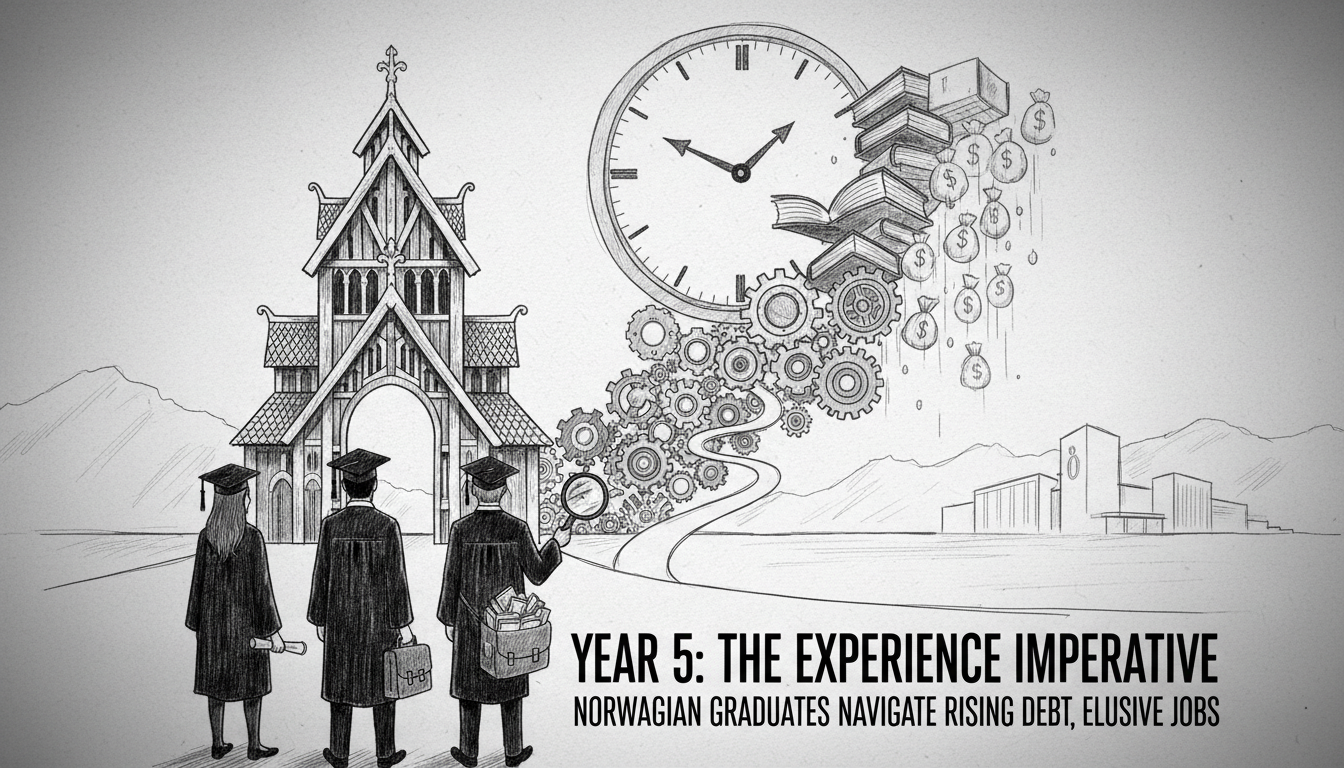Hannah Letmolie completed her bachelor's degree in economics and management this spring. Her dream was to become an accountant and eventually start her own company. But she faces one major problem.
Employers want experience. A bachelor's degree does not seem to be enough.
'How am I supposed to gain the experience workplaces demand when no one gives me the opportunity?' Hannah wonders.
She has applied for countless jobs. The few times she receives responses, companies want someone with experience.
In January, six months before finishing her degree, Hannah began job hunting. By June, she realized it was harder than expected and changed course.
'I applied for a one-year logistics study program to buy myself some time.'
Continuing studies allows her to maintain student financial support, which has been her income in recent years. It also postpones her student loan payments.
When asked about taking on more debt, Hannah responds, 'I can't get a job with just a bachelor's degree anyway. So it seems I have to study something more.'
If Hannah finds a full-time economics job soon, she will drop the additional studies. Otherwise, she will complete the year-long program. Either way, she accumulates more student debt.
This pattern is becoming increasingly common across Norway. The proportion of people with higher education has skyrocketed from 10% in the 1980s to 42% today.
Student loan statistics reveal concerning trends. More students graduate with high debt levels, and fewer have low debt. The number of students exceeding one million kroner in student debt continues to rise.
In the third quarter, 2,100 students crossed the one million kroner threshold. Only 1,500 students reached this level five years ago.
Data from the Directorate for Higher Education and Skills shows increasing numbers of bachelor's and master's graduates are continuing with additional year-long studies. From 2011 to 2024, this figure nearly doubled.
'There's an expectation in society today that people pursue further education and acquire different knowledge supplements throughout their working lives,' said Vibeke Bredahl, study director at the University of South-Eastern Norway.
A recent graduate survey revealed that 14% of bachelor's degree holders continue with new studies after completing their degree.
'A bachelor's degree provides a good foundation for entering working life, but many students want to specialize further with a master's degree,' the study director explained.
Among economics students at the university, 12% continue studying after their bachelor's degree. The highest proportions continuing education are found among those studying social sciences, law, and humanities.
To improve job prospects after graduation, the university encourages students to participate in student companies and similar activities that provide valuable experience.
'We recognize that for some, it can be difficult to get that first relevant job after completing education,' said Sigve Næss Røtvold, another official.
'You are a qualified worker with a bachelor's degree, and I think it's important that working life recognizes this. Don't expect completely ready-made candidates, but candidates who also need training for the job they'll do.'
Røtvold noted that most graduates find work within six months of completing their education. But individual cases like Hannah's remain problematic.
The Norwegian Student Organization acknowledges that taking a year of additional study can be smart for many. But they warn students become aware they receive less scholarship money under current rules.
'Now you only get 15% of the loan converted to scholarship if you take a year of study, compared to 40% previously. So you're left with considerably more debt if you take a year of study,' an NSO representative explained.
In practice, a completed year of study costs 141,830 kroner. If you don't complete it, the cost rises to 166,859 kroner.
The NSO wants this arrangement reversed, calling it unfortunate for students.
'For the student, it can really be good to supplement knowledge through a year of study. That's only positive.'
The organization advises students to use their study time to build their CV through student volunteering and organizational life, interacting with people in their desired industry.
'Unfortunately, not all students have the opportunity to participate in these very important activities because they need to spend time on part-time work. But try to build a different type of competence than what you get in the lecture hall,' Røtvold concluded.
Hannah continues applying for positions in her field, hoping to get a foothold in the industry to gain experience gradually.
'But still... There's nothing. At least for now. So for now, it looks like I'll complete the year of study, and then I hope that with my slightly more substantial degree, I'll be in a stronger position,' the 23-year-old said.
Despite taking additional studies because she couldn't find work, Hannah doesn't see it as wasted time. She found a program that builds on the expertise she wants to specialize in.
The reality is stark for today's graduates: when entry-level jobs demand experience that fresh graduates cannot obtain without those jobs, the education system risks becoming a cycle of credential accumulation rather than genuine preparation for work.
